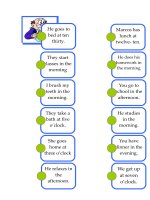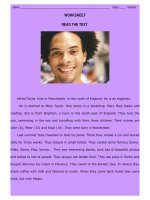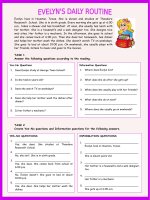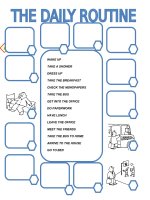22528 a pupils daily routine
Bạn đang xem bản rút gọn của tài liệu. Xem và tải ngay bản đầy đủ của tài liệu tại đây (228.75 KB, 3 trang )
B) Answer the questions about John Cunliffe’s poem.
1. What is the poem about?
---------------------------------------------------------------------------------------------------------2. Where do you think the reported “story” takes place?
---------------------------------------------------------------------------------------------------------3. What do girls do?
---------------------------------------------------------------------------------------------------------4. And what do boys do?
---------------------------------------------------------------------------------------------------------5. Do you think the poet is happy to go back home? Quote from the text to support your answer.
---------------------------------------------------------------------------------------------------------6. What does the poet do before going to bed?
----------------------------------------------------------------------------------------------------------
C) Put your daily routine in order and match the sentences with the pictures.
fall sleep
a
b
have a bath
go to school
watch television
d
c
do homework
make the bed
1st -------------------------------------2nd -------------------------------------3rd -------------------------------------4th -------------------------------------5th -------------------------------------6th --------------------------------------
e
f
A)
1. “Dream until / Another day.”
2. “Pencils write”
3. “Skipping ropes”
4. “Head on desk / Boy sleeps.”
5. “Sit down / Watch telly”
6. “Whistle goes, / All in!”
B)
1. The poem is about a pupil’s routine. It tells about his / her routine at school, the things
boys and girls do there, and what he / she does after getting home.
2. The reported “story” taKes place at school mainly (that is clear when we read the verses
“Pencils write”, “Teacher’s gone”, “Chalk squeaks” and when it describes children playing) and
also at home (the last two stanzas of the poem).
3. Girls giggle and flee. The text also suggests that they skip rope and clap their hands.
4. Boys may also skip rope, clap hands and play with the ball but what is more evident is
that they “fight”. (We can see that there is stereotyped behaviour in boys and girls.)
5. Yes, the poet is happy to return home. In the poem we can read “Home time, / Glory be”,
so the poet is clearly happy to be back home.
6. Before going to bed the poet eats (“Mum’s got, / Chips for tea” and “Full belly”), stands by
the fire (“warm fire”) and watches television (“Watch telly”).
C) (Please notice, this daily routine is not complete and there is more than one possible
answer)
1st – make the bed (a)
2nd –have a bath (c)
3rd –go to school (e)
4th –do homework (f)
5th –watch television (b)
6th –fall asleep (d)









